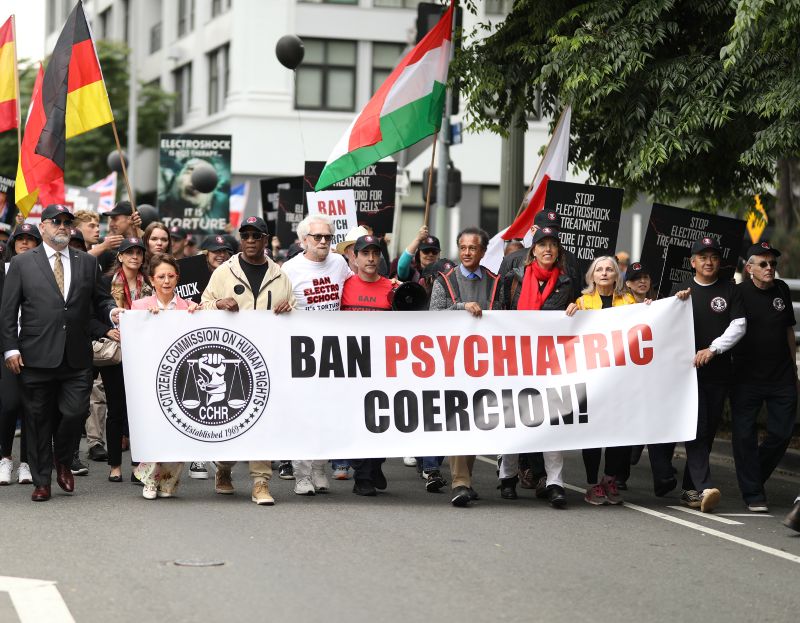The Citizens Commission on Human Rights advocates for the adoption of international standards in the U.S. that call for ending involuntary mental health treatment and ensuring human rights in the field of mental health.
A coalition of human rights advocates, civil rights leaders, clergy, medical professionals, and attorneys, led by the Citizens Commission on Human Rights (CCHR), protested at the Los Angeles site of the annual meeting of the American Psychiatric Association to call for ending forced mental health treatment. That behavioral treatment includes involuntary institutionalization, nonconsensual electroconvulsive therapy (ECT, or electroshock), forced drugging, and the use of restraints and seclusion.
The May 17 protest focused on the tragic deaths of people, especially young people, who died from mental health treatment involving restraints. Among them were Ja’Ceon Terry, a 7-year-old who suffocated while being restrained at a residential behavioral treatment center in Kentucky, and Cornelius Frederick, 16, who died after being restrained at a Michigan facility for youth with behavioral problems.
“Until coercive and deadly practices in mental health are prohibited, vulnerable individuals – especially children – will continue to suffer,” said Jan Eastgate, president of CCHR International, speaking at the protest.

Rev. Fred Shaw, Jr., president of the Inglewood South Bay branch of the NAACP, spoke to the gathering about the disproportionate use of restraints on African Americans. Research has indicated that Black psychiatric inpatients are nearly twice as likely to be subjected to physical, mechanical, and chemical restraint compared to White patients and more likely to be restrained longer.
Guidance issued jointly in 2023 by the World Health Organization (WHO) and the United Nations Office of the High Commissioner for Human Rights (OHCHR) lays out steps towards ending coercive practices and “establishing mental health services that are respectful of human dignity and comply with international human rights norms and standards.”
Those standards call for “free and informed consent as the basis of all mental health-related intervention,” as well as patients’ “effective and meaningful participation” in mental health treatment, according to the WHO/OHCHR guidance.
The World Psychiatric Association has committed to ending coercive practices, but the American Psychiatric Association (APA) has not yet come into alignment with this international standard. CCHR has called on the APA to issue a formal statement in support of the elimination of coercive psychiatric practices and involuntary detentions.
During the protest, CCHR also pointed to the failure of massive federal mental health funding to reduce the U.S. suicide rate. While mental health funding totaled some $329 billion in 2022, a 315% increase from 2000, the suicide rate hit a record high in 2022, a 37% increase since 2000, according to the U.S. Centers for Disease Control and Prevention (CDC). Over 49,000 people died by suicide in 2023, or one death every 11 minutes.
CCHR continues to call on Congress to redirect mental health funding to programs and services that provide effective help for Americans experiencing mental health issues.
